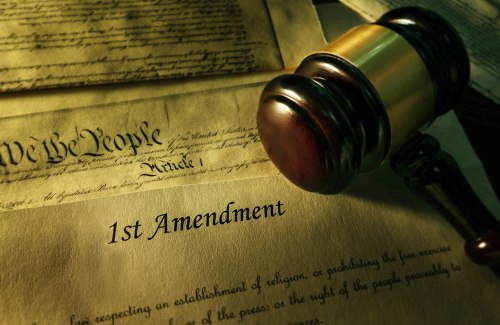University's ban on ‘discriminatory harassment’ likely violates the First Amendment, 11th Circuit says

Image from Shutterstock.
A federal appeals court has ruled that the University of Central Florida’s ban on speech constituting “discriminatory harassment” likely violates the First Amendment.
The 11th U.S. Circuit Court of Appeals at Atlanta ruled Thursday in an opinion by Judge Kevin Newsom. The Volokh Conspiracy has highlights in a series of posts here, here, here and here.
The appeals court said the discriminatory-harassment policy likely violates the First Amendment because its regulation of constitutionally protected speech appears to be overbroad, content-based and viewpoint-based.
The plaintiff in the case was Speech First, a group that seeks to protect students’ free speech rights. Its members include “Student A,” who wants to express views against abortion, affirmative action, illegal immigration and LGBTQ issues. “Student B” and “Student C” express similar desires.
All three students say they are reluctant to talk about their opinions because of the university’s policies that ban discriminatory harassment and address “bias-related incidents.”
The discriminatory-harassment policy bans conduct that unreasonably alters a student’s participation in a program or activities if the conduct is based on a long list of characteristics that include religion, genetic information and political affiliation. Students are also barred from condoning or encouraging such discriminatory conduct, and they are required to intervene to stop it.
The bias-related incidents policy created a “Just Knights Response Team” to provide assistance to those who have witnessed a hate-related or bias-related incident.
The 11th Circuit ruled that Speech First had standing and then moved on to the merits.
The discriminatory-harassment policy is “staggeringly broad,” the appeals court said. It “restricts political advocacy and covers substantially more speech than the First Amendment permits.”
The policy is also content-based because it requires the university to examine the content of the message to determine whether it is harassment, the appeals court said. Nor does the policy appear to be narrowly tailored because it applies to a wide variety of speech.
Beyond that, the policy likely discriminates based on viewpoint in that it bans speech that is discriminatory, the appeals court said.
“In prohibiting only one perspective, UCF targets ‘particular views taken by’ students and thereby chooses winners and losers in the marketplace of ideas—which it may not do,” the decision said.
A lower court had determined that Speech First didn’t have standing. The 11th Circuit remanded the case to allow analysis of the First Amendment claim and a decision on an injunction.
“Nowhere is free speech more important than in our leading institutions of higher learning. Colleges and universities serve as the founts of—and the testing grounds for—new ideas,” the appeals court said.
“Accordingly, it is imperative that colleges and universities toe the constitutional line when monitoring, supervising, and regulating student expression. Despite what we presume to be the very best of intentions, it seems to us substantially likely that the University of Central Florida crossed that line here,” the 11th Circuit said.



